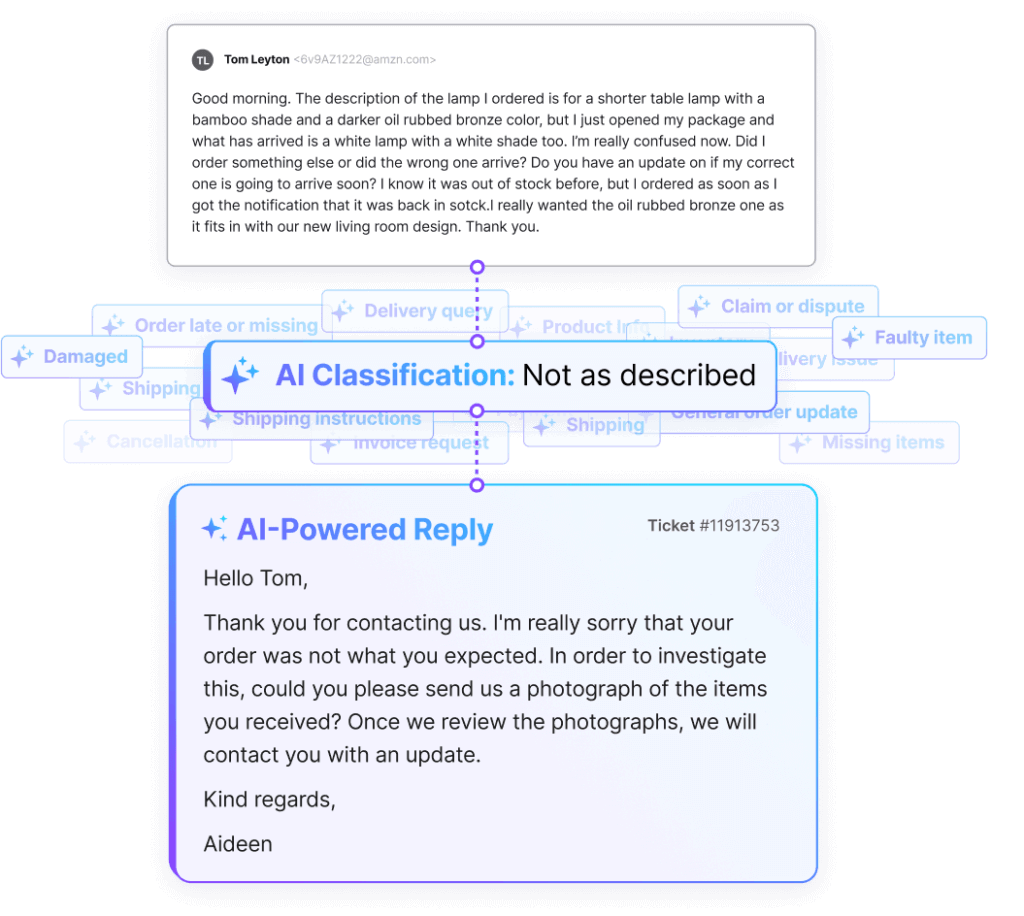In the eCommerce world, we know how much work goes on behind the scenes of every customer’s online shopping cart, tailoring every aspect of the digital experience. Displaying products that instantly catch your customer’s interest and sending alerts for discounts on items they’ve been eyeing are just small parts of a much larger complex mechanism. This is the world where technology meets commerce, and it’s time for a brave new leap: artificial intelligence in eCommerce.
New introductions like predictive searches, personalization algorithms, and tailored product recommendations all underscore the swelling role played by artificial intelligence. A force silently revolutionizing how we shop today, it’s fast becoming an indispensable tool on the buzzing eCommerce scene.
Artificial Intelligence in eCommerce
Artificial Intelligence has made significant inroads in various industries, but its impact on eCommerce is particularly noteworthy. AI technologies, including machine learning algorithms, analyze vast datasets from customer interactions to generate actionable insights. This has (and will continue to) revolutionize the way businesses engage with customers, by creating personalized experiences and enhancing competitiveness.
The integration of AI in eCommerce not only benefits consumers through tailored experiences but also empowers retailers with advanced tools for real-time tracking of performance metrics. According to recent statistics, the global artificial intelligence in eCommerce market is valued at $8.65 billion in 2025 and is expected to reach $22.60 billion by 2032, with a compound annual growth rate of 14.60% from 2024 to 2032. This symbiotic evolution between eCommerce and AI is shaping a dynamic environment that holds the potential for disruptive changes in the industry, driving both enhanced customer support and increased sales.

How Artificial Intelligence Will Disrupt eCommerce
- AI is revolutionizing eCommerce through rapid and accurate data analysis.
- Personalization is a key area where AI is making a significant impact, offering real-time recommendations.
- Machine learning automates operational tasks like inventory management and product cataloging.
- AI-powered image recognition and voice-activated assistants are enhancing the user search experience.
- Advanced algorithms are improving demand forecasting by utilizing historical data.
- Chatbots with natural language processing are elevating customer service by offering 24/7 support.
AI is a disruptive force in eCommerce, meaning early adoption is crucial for staying competitive. In fact, 93% of retail organizations agree that generative AI is a topic of discussion in their boardroom, while 62% of retail organizations have a dedicated team and budget to integrate AI into their future product and service development plans.
4 Benefits of Using AI in eCommerce
Harnessing the power of artificial intelligence brings various advantages to eCommerce. AI employs machine learning and predictive analytics, making retailers’ lives easier while simultaneously offering consumers an enhanced shopping experience. Let’s dive into these benefits.
1. Increased Customer Engagement and Satisfaction
AI-driven eCommerce attracts customers and keeps them invested and content. The hallmark is personalization; AI algorithms can gauge user preferences and showcase products specific to each individual’s liking, based on their past browsing history or purchases. This targeted approach maximizes customer engagement as they feel uniquely catered to, leading to higher satisfaction rates.
Recent studies show that over 50% of eCommerce businesses have adopted AI technologies, with AI-driven personalized recommendations contributing to a 15-20% increase in conversion rates. Furthermore, 80% of customers say they are more likely to do business with a company if it offers personalized experiences.
Imagine being greeted by a personalized list of recommended items every time you visit your favorite online store – that’s exactly what AI can do.
2. Improved Customer Experience

It is critical that online retailers strive for excellent customer service, which eventually translates into brand loyalty – and that’s where AI for eCommerce becomes essential.
With technologies such as chatbots and virtual assistants, businesses are always available for queries by potential customers – 24/7, without breaks. They help minimize wait times during service requests, thereby improving the overall customer experience. AI systems can handle up to 80% of all customer interactions, reducing operational costs significantly.
To explore specific AI customer service examples, many companies are implementing solutions that help analyze customer sentiment and prioritize responses based on urgency.
Further leveraging augmented reality (AR), some companies now let customers visualize how a new couch may look in their living room or a dress would appear when worn – it’s almost like having an upgradeable physical store on their devices.
3. Automation of Mundane Tasks
Time is money, especially in eCommerce. Thankfully, with the adoption of AI, mundane tasks (such as inventory management or handling routine customer inquiries) can be automated, and save substantial amounts of time.
Smart solutions like eDesk AI are equipped with the ability to automatically analyze the sentiment expressed in customer messages to understand their emotional state, prioritize tickets based on urgency (or other criteria) and auto-respond to routine queries. Discover eDesk’s AI capabilities to see how automation can transform your eCommerce operations.
By freeing up human resources from repetitive work, companies provide their employees with opportunities to focus more on strategic roles that add value to the business. This creates a win-win situation by boosting productivity and developing employee skills.
4. More Accurate Forecasting and Analytics
AI in eCommerce caters to more than just better customer service – it also provides insights for crucial decision-making through predictive analytics.
Intelligent systems are capable of sifting through vast data sets to analyze patterns, trends and customer behaviors, thereby fostering more accurate demand forecasting. With such refined analytical tools at their disposal, online retailers can optimize stock levels and dodge potential sales losses due to out-of-stock situations.
AI-powered forecasting can help businesses reduce inventory costs by up to 75%, according to recent studies. This improved accuracy has led to a 65% reduction in lost sales and a decrease in warehousing costs by 10% to 40%.
Machine learning algorithms can also pick up inconsistencies or unusual trends, which aid in detecting fraud and offer an additional layer of security.
Now you know the benefits of AI’s application in eCommerce let’s take a look at the ways you can implement it, so those benefits become a reality for your eCommerce stores. To understand the key benefits of implementing AI in more depth, explore our detailed resources.
10 AI Use Cases in eCommerce
The powerful application of AI commerce really shines when we look at its versatility. There is an array of use-cases where eCommerce artificial intelligence is playing a pivotal role, and it’s worth exploring them to see why incorporating AI into your business strategy can be a game-changer. Here are some top AI use cases in eCommerce that are transforming the industry.
1. Personalized Product Recommendations
Possibly the most visible implication of AI for eCommerce lies in the mechanism of personalized product recommendations. Using customer data and learning from behaviors, algorithms can now predict what customers may like or need next, delivering custom-tailored suggestions that increase both satisfaction and sales.
According to recent data, 58% of Millennial consumers and over 40% of Gen X and Baby Boomer respondents expressed a desire for more personalized product recommendations in e-commerce. This personalization approach is driving significant revenue growth for businesses that implement it effectively.
2. Pricing Optimization
Another significant benefit drawn from implementing AI in eCommerce includes pricing optimization. Fueled by real-time market analysis, dynamic pricing tools such as repricer.com determine the best prices based on supply, demand, competition analysis, and consumer behavior patterns, thereby maximizing profits while maintaining competitiveness.
Modern AI-powered pricing tools like Intelis and WISER adjust prices using competitor data and profit goals, ensuring that your products remain competitive without sacrificing margins.
3. Enhanced Customer Service

AI’s capabilities in customer service extend far beyond proactive issue identification; they delve into sophisticated areas like sentiment analysis, query classification, and automated responses. For instance, AI algorithms can analyze the tone and context of customer queries to understand their sentiment, whether it’s frustration, confusion, or satisfaction.
This enables eCommerce customer service platforms like eDesk to prioritize responses or even tailor the tone of automated replies to better resonate with the customer’s emotional state. Learn about AI chatbots for eCommerce and how they can revolutionize your customer service approach.
AI can also classify incoming queries into various categories such as billing, technical support, or product inquiries. This classification allows for more efficient routing to the appropriate customer service representatives or departments.
Often, AI can autonomously provide accurate and reliable answers to common questions, reducing the need for human intervention and speeding up response times.
This is particularly beneficial in a competitive market where quick and effective customer service can set a company apart from competitors. Additionally, AI-driven automations can handle repetitive tasks, and templates can be used for frequent query types, making the customer service process more efficient.
These AI-powered features streamline operations and enhance the quality of customer interactions, making them more personalized and responsive.
Learn more about eDesk:
4. Customer Segmentation
In addition to personalization at an individual level, AI provides insights for detailed customer segmentation. By tracking browsing behaviors and purchase histories across wide demographics, businesses are equipped to design more targeted marketing campaigns that hit home those messages relevant to each specific group.
AI can use details like buying habits, geographical location, and age of buyers to build customer personas. For instance, a 60-year-old living in China is going to have very different shopping preferences compared to a 25-year-old techie from the U.S. AI collects this data to spot patterns and trends in behaviors to offer highly personalized shopping experiences.
5. Smart Logistics
In the era of same-day deliveries being standard practice instead of a luxury service – intelligent logistics powered by AI have become crucial components within the operation chain in eCommerce. Algorithms nowadays pleasantly surprise us with their ability to optimally manage inventory levels based on trend predictions.
Agentic AI, a new form of artificial intelligence that works autonomously to achieve business goals, is transforming how businesses handle logistics by bringing adaptability and real-time optimization to operations. This technology is expected to gain momentum between 2025 and 2030, according to most worldwide CEOs.
6. Sales and Demand Forecasting
Accurate sales predictions with minimized discrepancies are now a reality – thanks to AI’s machine learning capabilities. This phenomenally useful feature of AI in eCommerce can help businesses reduce waste, optimize supply chain efficiency, and provide realistic delivery timelines.
The market revenue of machine learning is proliferating at a CAGR of 50.8% from USD 18.4 million in 2019 to USD 216.6 billion by 2025. It considers past activity along with historical data to draw inferences and speed up decision making, identifying patterns in customer behavior and purchase history to arrive at meaningful conclusions.
7. Chatbots and Virtual Assistants

Enter chatbots …arguably one of the most user-facing technologies powered by Artificial Intelligence in eCommerce. Working around the clock, these virtual assistants offer tailored support instantly. It’s like having your own personal shopping assistant, which never takes breaks.
New AI voice agent solutions like Synthflow AI and Octocom are optimizing shopping by automating customer interactions, acting as AI answering services for product questions, and providing instant voice assistance when needed. These tools help eCommerce stores deliver personalized customer service around the clock.
8. Voice Search
With the increasing popularity of smart devices such as Alexa or Google Home, consumers are searching for products using voice commands more than ever before. eCommerce platforms adopting voice technology considerably enhance their user experience, offering better convenience and faster processes to customers.
According to industry experts, voice and conversational commerce will be a game-changer for the retail landscape by 2025. Powered by AI tools like ChatGPT, Copilot, and Claude, consumers will increasingly turn to voice assistants for everything from placing orders to receiving personalized recommendations.
9. Customer Churn Prediction
Notably important is AI’s role in managing customer retention: With churn prediction algorithms, we can foresee risks ahead of time – sometimes even before customers themselves might consider leaving – and use this foresight to devise tactics aimed at maintaining positive consumer relationships.
Machine learning models can analyze customer behavior patterns, purchase frequency, browsing history, and support interactions to identify customers at risk of churning, allowing businesses to proactively engage with them and improve retention rates.
10. Review Filtering
Last but certainly not least, another effective area where you’ll see AI for eCommerce used includes review filtering. By automating the review collection and analysis process, solutions like Feedback, powered by eDesk provide actionable insights that can lead to improved customer relations and better-informed business decisions.
AI can analyze customer reviews to help you address negative feedback, identify product issues, and highlight positive aspects that can be leveraged in marketing campaigns. This level of analysis was previously reserved for large-scale research projects.
Challenges of Using AI in Ecommerce
As promising as the intersection of AI in eCommerce may be, it comes with its own unique set of challenges. It’s crucial to consider these potential hurdles before delving into significant investments in technology.
Dependence on Quality and Volume of Data

Perhaps one of the most notable challenges is the need for massive quantities of high-quality data. Without this, e-commerce artificial intelligence tools can’t function optimally or deliver accurate insights. Large volumes of data are critical for machine learning algorithms to improve over time by identifying patterns and learning from them.
Next, there’s the issue surrounding data quality. Poor quality or inconsistent data leads to unreliable results – an undesirable scenario in a dynamic field such as eCommerce, where every decision impacts your bottom line.
High Initial Investment Cost
Another common concern revolves around cost. Adopting AI in commerce isn’t cheap – it requires not only substantial financial investment but also considerable time and human resources implications. This factor can pose a challenge, especially for small businesses barely starting out and have yet to amass a budget capable of fulfilling all the requirements for AI integration.
Technical Skill Requirements
AI implementation typically requires sophisticated technical know-how. Depending on the complexity, employing an AI in eCommerce may necessitate hiring expert developers or even partnering with specialized tech firms that hold expertise in navigating such a technological landscape.
Privacy Concerns linked to AI Use
Finally, there’s also a delicate balance between creating personalized shopping experiences using eCommerce artificial intelligence and infringing upon customer privacy. A matter that holds extreme significance today more than ever owing to expanding laws and regulations like GDPR within Europe, designed specifically to protect consumer rights concerning privacy online.
For organizations to successfully navigate through these complexities associated with integrating technology in eCommerce, they will need strategic planning not only centered around addressing present priorities but also preemptive anticipation of potential issues that could arise down the road.
Best eCommerce AI Tools to Try
The incorporation of AI in eCommerce signals a revolutionary way to engage with customers, streamline operations, and make more accurate business decisions. To effectively tap into the world of AI commerce, it’s important you arm yourself with impactful tools designed to maximize the benefits of artificial intelligence for eCommerce. Here are some exemplary tools to set you up for success.
1. eDesk
An eCommerce customer service solution that uses the power of AI to keep your customers happy and grow revenue. eDesk AI can automatically analyze sentiment in customer messages, prioritize tickets based on urgency, and auto-respond to routine queries, making it an essential tool for modern eCommerce businesses.
Learn more about eDesk:
2. Klevu
A search and navigation tool, Klevu uses AI to enhance the shopping experience by offering personalized product recommendations based on customer input. This frees up significant time shoppers might otherwise spend trawling through countless products.
3. Shopify Magic
A versatile AI assistant that helps with everything from product descriptions to customer service. Shopify Magic features include Sidekick Assistant which analyzes data and offers personalized recommendations, from pricing strategies to marketing angles, as well as one-click background removal for professional product imagery.
4. Lyro AI Chatbot
An innovative AI solution tailored specifically for the eCommerce sector, designed to revolutionize how online shops engage with their customers. Leveraging natural language processing (NLP) technologies, Lyro enables online retailers to provide instant, 24/7 customer support and shopping assistance across their websites.
5. Nosto
A powerful AI-driven platform that creates personalized shopping experiences for eCommerce websites. It harnesses the power of big data, artificial and business intelligence, and dynamic targeting to analyze a customer’s behavior, preferences, and purchase history.
6. Octane AI
Not only does Octane provide notable assistance in marketing automation, but also introduces efficient methods for conducting quizzes and facilitating retargeting initiatives via Facebook Messenger. The tool creates simple product quizzes to guide customers and gather valuable zero-party data.
7. Vue.ai
If looking at clothing retail specifically, Vue.ai stands out due to its proficient capabilities for outfit recommendation and style pairing – guaranteed to save today’s busy shopper valuable browsing hours.
Each one of these tools harnesses technology in eCommerce and amplifies what is achievable even within large-scale operations. It’s vital however to not just know about these tried-and-tested solutions but also be flexible enough as an enterprise to invest time or resources into testing such platforms and how they align with your unique business model and goals.
Integrating e-commerce artificial intelligence tools like these, is the first step towards creating a future-oriented business strategy that leverages AI in eCommerce to bring an enriched and immersive shopping experience to your customers. Given their robust outputs, it’s clear AI for eCommerce is not just here, it’s here to stay. Consequently, investing in such AI technology in eCommerce has changed from a ‘nice to have’ into a ‘must-have’ within competitive markets
How to implement artificial intelligence into eCommerce operations
Integrating AI into your eCommerce operations can revolutionize your customer experience, ignite sales growth and foster efficiency. Let’s explore some effective ways you can implement AI in eCommerce.
Firstly, an overview assessment is vital before diving right in. Study existing processes and identify areas where AI could prove beneficial. Understand the requirements of your business. Is it personalized product recommendation or predictive analysis for better inventory management? Once you know what you need, implementing AI in eCommerce becomes much easier.

To that end, investing in off-the-shelf AI tools specially crafted for online businesses could be a good starting point. There are tools focused on specific aspects, like pricing optimization or enhancing customer service with AI hands-free responses, or auto analysis and prioritization of customer queries.
And don’t underestimate the importance of data. Having copious amounts of clean, structured data feeds the intelligence of AI algorithms. This means ensuring you have mechanisms to collect rich data about customers’ preferences and buying habits, inventory levels, supplier performance and more.
Explicit attention should also be given to integrating AI with your existing tech stack without disrupting the current workflow too drastically initially; you want a smooth transition rather than sudden change which could negatively impact both staff and customers while they adjust.
Partnering with experts specializing in eCommerce artificial intelligence solutions is another step often worth considering. These experts could guide you through implementation with tailored plans aligning perfectly with your business needs, whilst mitigating possible challenges which may arise during the transition period.
Creating an AI-enabled immersive shopping experience is no small feat – it requires patience, resources, and persistence, yet yields unmatched rewards, potentially transforming an erstwhile traditional online store into a next-gen eCommerce hub powered by state-of-the-art technology in eCommerce.
By embracing artificial intelligence in your eCommerce operations, you’re not just keeping up with trends – you’re positioning your business at the forefront of retail innovation for 2025 and beyond.




